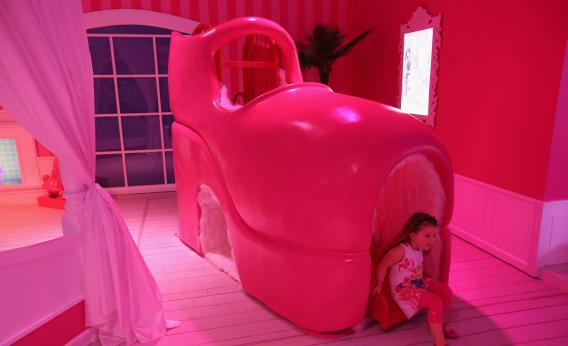Where do you even start with Barbie? Few toys inspire such feminist gnashing of teeth as the 11 ½-inch plastic doll, with her blindingly white skin, impossible figure, and fathomless wardrobe. And now her Dreamhouse tourist attraction has descended, like the hut from the Baba Yaga story, on Berlin, where it’s been greeted by topless protestors waving burning crosses and men ironically dressed in pink skirts and blond wigs. “Occupy Barbie’s Dreamhouse,” they cry, condemning the doll for promoting consumerism, narcissism and unhealthy body ideals. Their placards—and torsos—are scrawled with slogans like “Pink stinks!” “I will free you from the horror house,” and “Life in plastic is not fantastic.”
It’s easy to sympathize with the 99 percent here: The Barbie Dreamhouse Experience, which opened its doors last Thursday in the middle of grey Alexanderplatz, is a 26,900-square foot shrine to all things pink, shimmery and superficial. Inside, kids can “bake” virtual cupcakes on touch screens (Is it worse that it’s virtual baking or that it’s cupcakes?), lust after Barbie’s shoe collection, loll around in stiletto-shaped chairs, work a catwalk, or lip-sync pop tunes on a karaoke stage. Why, you might ask, can young visitors only choose careers such as “pop star” and “supermodel?” “Pretending to be an engineer is a hard concept for a four or six-year-old to play out,” Mattel’s Stephanie Cota told the Wall Street Journal. Meanwhile, demonstrators called the exhibition a “seemingly endless walk-in closet.”
In defense of this feminist’s nightmare, the house’s advocates have marshaled the language of fantasy and play. “I feel sorry about how some people interpret our giant pink playground,” said Christoph Rahofer, of EMS Entertainment, which co-created the dreamhouse experience. Even Michael Koschitzki, a member of the demonstrating youth group affiliated to Germany’s far-left party, die Linke, felt the need to hedge, “Our protest is not directed towards little girls and their dreams.”
Perish the thought. I won’t waste your time running through all the reasons why the Barbie dream in particular is so perverse—the layers of racism, materialism, vanity, body insecurity, and passivity billowing around it like so much gauze—but I would like to challenge the idea that anyone today can get away with anything simply by invoking that hallowed word: dream. We cannot reject Barbie’s ridiculous mansion, we infer, because doing so would trample on little girls’ dreams. It would poison their play. The defense of the Dreamhouse is built into its name, as if any attempt to speak out against it would necessarily crush the tender shoots of youthful imagination under a big slab of adult agenda.
Look, I get the gossamer loveliness of dreams, the bigness of them. I swoon for Keats and Gatsby and am getting weepy just thinking about the gorgeous rebuttals that will probably appear in this post’s comment section: In Praise of Dreaming, Dreams Make Us Human, etc. But despite what they tell you, a dream is not the same as a plan or a vision or an aspiration. It is the ultimate in passivity, something visited upon you while you are asleep. Or it’s what a princess does as she gazes out the window and waits for her happy ending. Do we need to telegraph to girls that the be-all and end-all of their young lives is spinning out beautiful mental pictures that have no basis in reality? Because, ultimately, that’s where the dreaming defense gets its juice: It’s a way of assuring critics, “this isn’t real, it’s nothing to worry about, it’s just a game.” (“Baking a digital cupcake on a touch screen in the Dreamhouse kitchen won’t confine you to stand by an oven for the rest of your life,” insists Rahofer.) But if Barbie’s proportions, celebrity and overall way of being aren’t attainable, then why dangle them in front of girls’ faces in the first place? Why invite tourists into the glowing pink rooms with the endless shoes and the runways and the sugary treats that never get eaten? (This is a rhetorical question: The answer is $29 tickets and a gigantic gift shop.)
I have a modest fantasy in which Mattel and co. stop using the word “dream” as their get-out-of-jail free card. But while it’s a pleasant thought and good imaginative exercise, sometimes you need more than fantasy. Sometimes you need to wake up and get to work.
